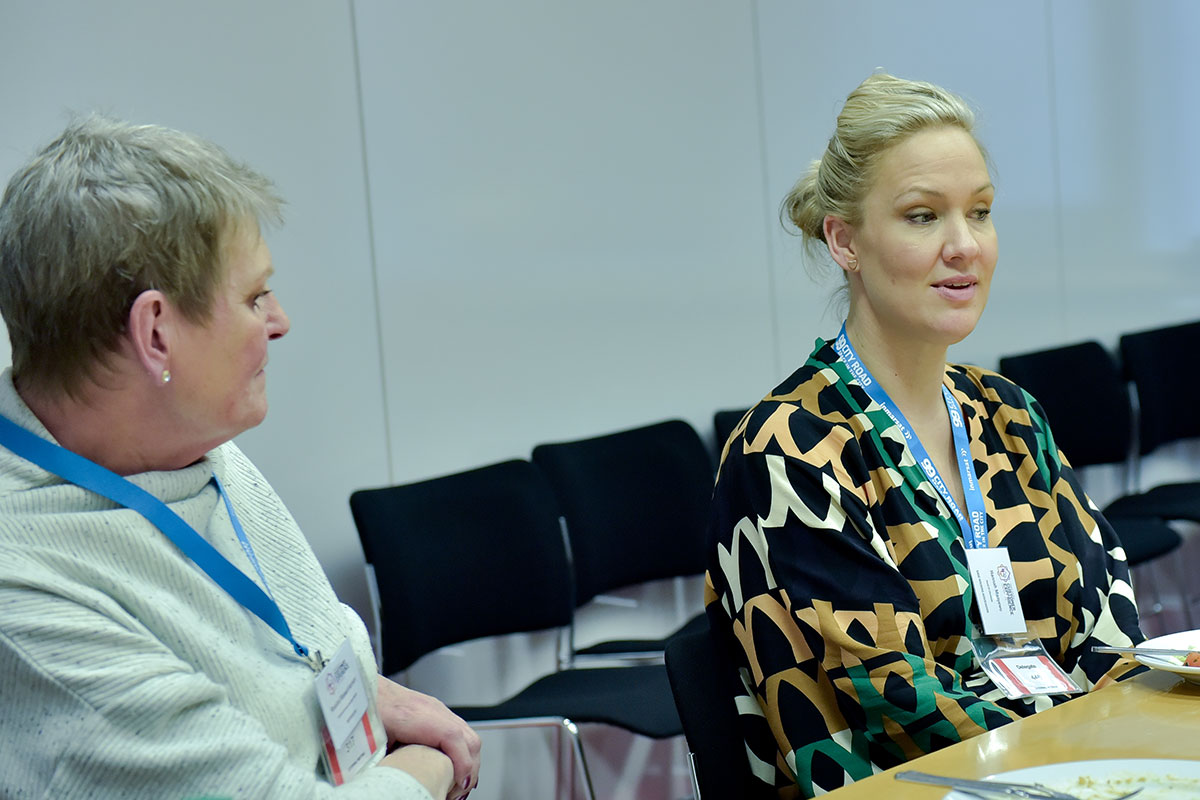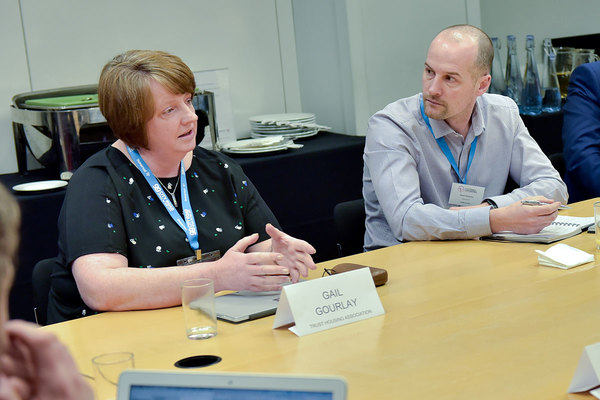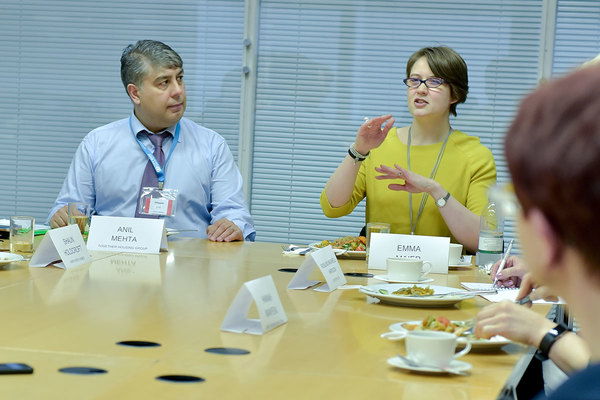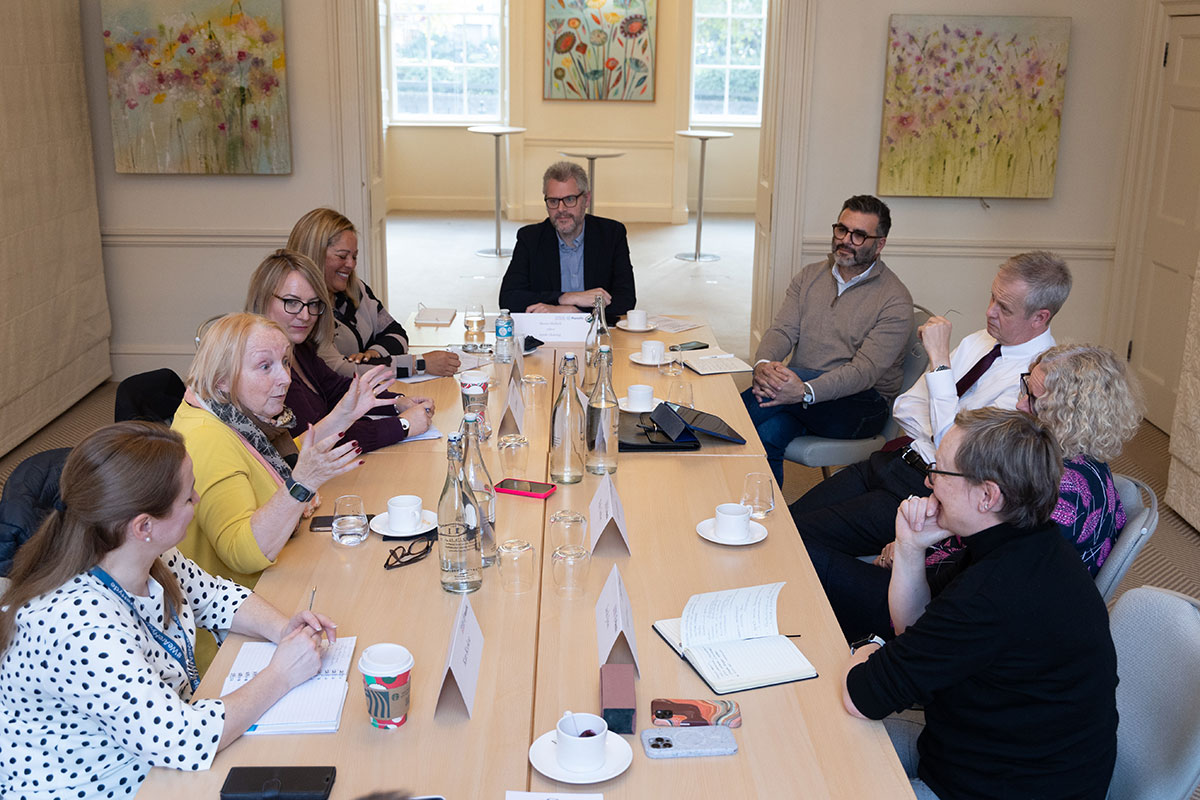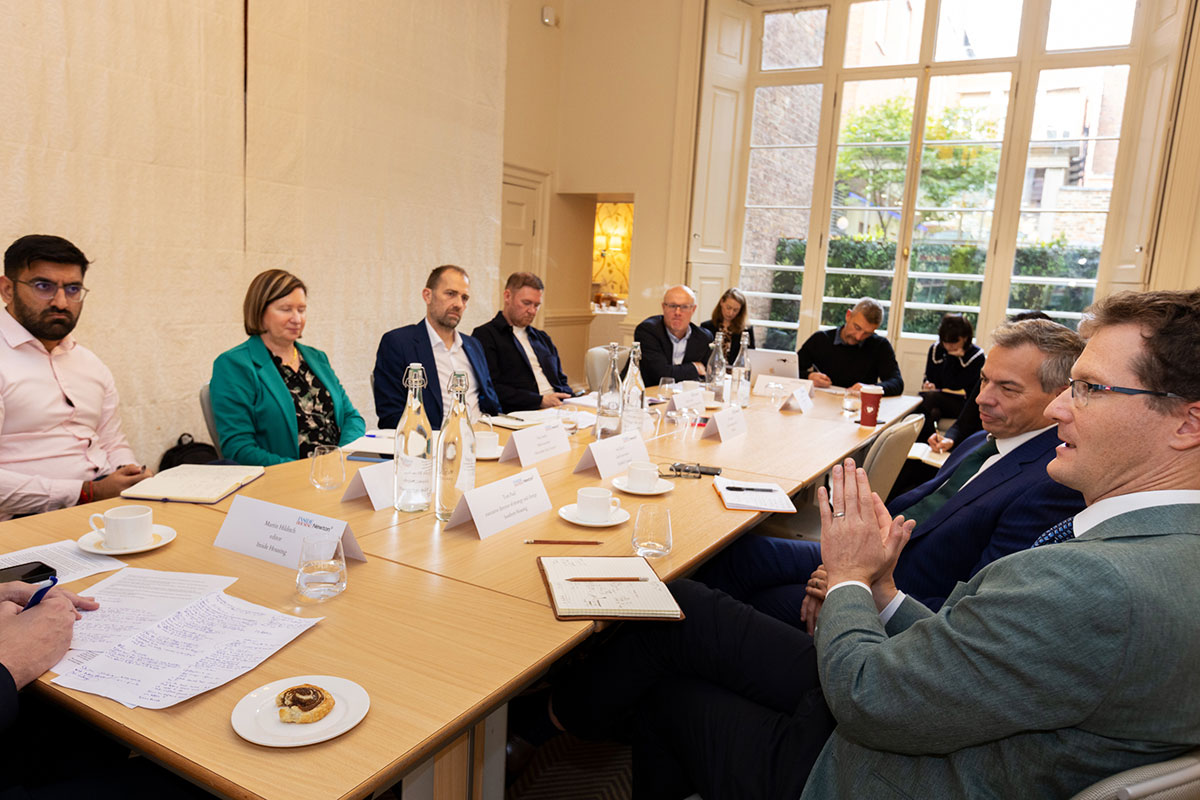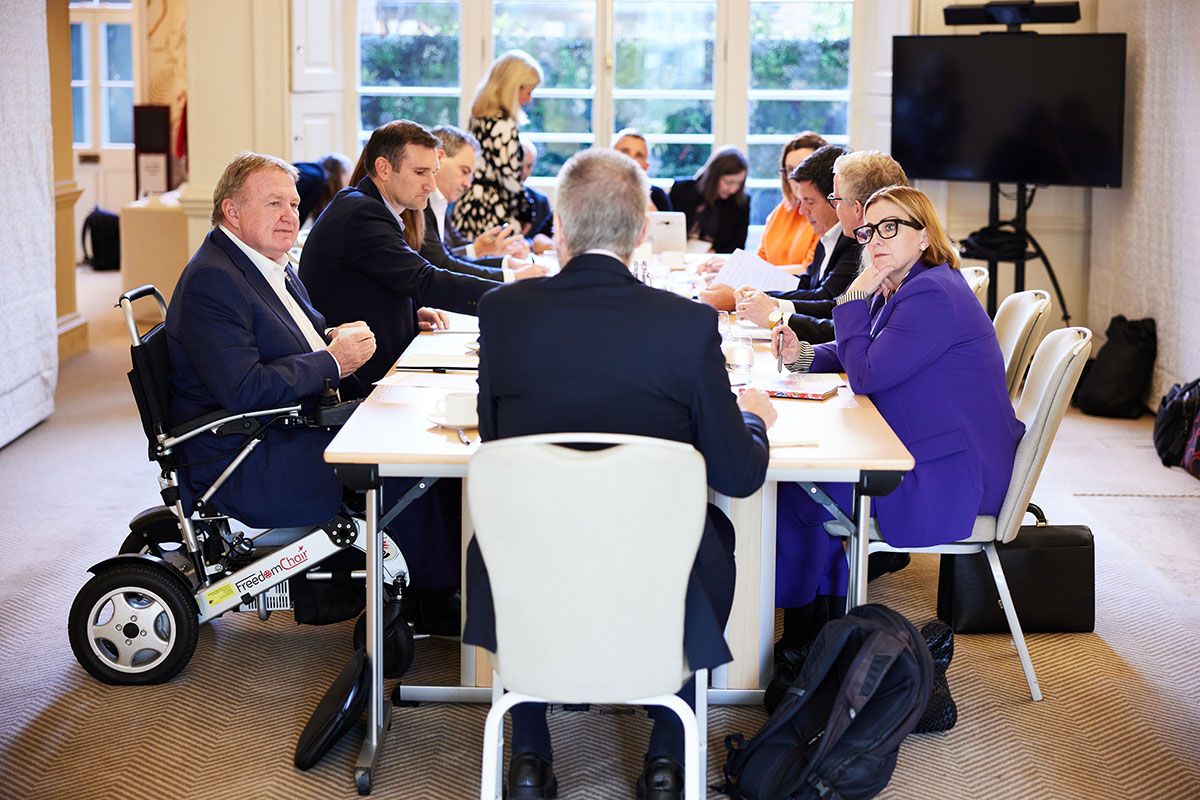The technology transformation
Inside Housing and NGDATA gather together sector experts to discuss the impact technology is having on their housing businesses, and how it can improve ways of working in the future. Photography by Graham D. Holland
In association with:

Technology is changing the world with frightening speed. It has transformed fundamental aspects of our lives, from how we communicate with each other to how we consume goods and services – as well as the ways we interact with those who provide these services to us.
Social landlords are no different. Technology has the potential to support smoother and more meaningful communication between landlords and their tenants, driving improvements in how housing providers understand the people they serve and the ways they deliver services to them. Get it right, and the potential for stronger relationships with service users – as well as happier tenants and treasury departments – is significant.
But as the old computer programmers’ maxim goes: garbage in, garbage out. Technology has the potential to transform the sector, but its introduction
must be handled carefully.
These are the subjects under discussion at a round table session held as part of Inside Housing’s first ever Customer Experience Conference in London. How can landlords leverage technology to improve their understanding of, and relationships with, their tenants? How can providers keep pace with the fast-changing world which they and the people they serve inhabit? And how can they harness new technology without leaving behind those who are unable or unwilling to embrace the digital revolution?
To begin the discussion, Emma Maier, editor of Inside Housing, asks the table about some of the challenges on the path to successful implementation.
Pro technology
Rosalind Maxwell-Harrison, a tenant of Metropolitan for 22 years and a member of its customer quality committee, gets things underway on a positive note. “I am very pro the use of digital technology,” she says. “I see people using it and getting frustrated when they have to go back to legacy systems… Technology is great and will get much more engagement with tenants and leaseholders.”
But, she adds, without a “sea change” in attitudes towards social housing tenants – including a traditional belief that they are a group that is less capable of, or less interested in, using technology – there is a worry that landlords might simply have compliance, rather than excellence, on their minds.
That stereotype is nonsense, argues Grant Sharman, group head of IT at Aspire Housing. Within the past month-and-a-half, he says, Aspire has launched a new online services portal: “The expectation is that social housing customers don’t use technology or can’t use it. But we have seen take-up in the first month from 17% of our customers, and that’s with no marketing,” he says. “And the web chat – replacing phone calls – has had a 9% take-up in the first month as well. There is a requirement to do things differently.”
“The biggest challenge is persuading colleagues that our customers are the same people who are the customers of Sainsbury’s and every other service there is,” says Kate Jungnitz, director of customer services at Plus Dane Housing. “If they can buy their car tax online, then they can do things for us online. They don’t want to stand in a queue for our contact centre. They want to get on with their lives like everyone else.”
Don’t leave tenants behind
However, she adds that there will always be 10% of people who will “never be able to afford to do that, or will never have the capacity… We have to make sure we know who those customers are so we can target our services to them”.
“You can’t leave people behind if they are not tech-savvy and don’t want to be,” agrees Ian Matthews of NGDATA. “In the same way you are trying to adapt to the generation after the millennials who will do everything on their phones and potentially won’t ever own a computer, there is another set who just can’t interact like that – and you can’t force them to.”
Hannah Manyewu is housing services director at Sage Housing Association, a new player in the sector with just four homes under management at present. But even with a clean slate, unencumbered by legacy systems, Ms Manyewu says keeping up with the pace of new technology is tough.
“The biggest challenge for the sector is speed,” she says. “It feels like we are still fiddling around with an app, for example, when it seems as though [the world] has moved on already. We don’t have legacy issues but we are still finding it difficult to keep pace with what is changing.”
That said, however, housing providers must also be wary of buying shiny new toys for their own sake, argues Gail Gourlay, director of customer services at Trust Housing Association. “Too often we see things as how we can transform digitally, and I think that’s the wrong starting point,” she says. “We need to look at what it is we are trying to do. Some of the solution might be digital… but some things are not best done digitally. It’s not always the absolute answer.”
Many of these issues are aspects of a broader goal: knowing your tenants in as much detail as possible. “If you know enough about not just who they are but the things around them; their ecosystems – their family, their community, where they are living now, where they’ve lived before… Understanding enough about that will allow you to shift their experiences,” says Mr Matthews.
“Sometimes it’s knowing how they want to be talked to, and being able to say: ‘This person always has repairs issues – we need to find out why. Can we do something proactive instead of coming in and fixing it each time?’”
The key to this, he adds, is data. It has to be comprehensive, accurate and in the same place. Landlords might use several different software systems, each with its own set of gathered data.
Technology in action
Some of the housing providers represented around the table shared how they have been using technology in different ways to improve the lives of their tenants.
Shaun Holdcroft, of North Hertfordshire Homes, mentions the importance of outside areas and communal spaces to residents’ well-being and community pride.
A previous employer, he recalls, set aside a pot of money each year to fund improvements to the communal areas in its estates – but each year the pot went largely unspent.
“So we put the money on [crowdfunding site] Spacehive and said to our customers: ‘Anyone who comes up with an idea, if you can get enough likes from other tenants and can attract some investment from other partners, we will fund the project.’ There is a real opportunity there to change the way people see us as a facilitator, managing and investing in civic space,” he says.
Trust Housing Association, meanwhile, has installed free wi-fi in every flat within its staffed schemes for older people. By training staff and recruiting tenants as digital champions, the scheme “has opened up a new world for people”, says Gail Gourlay. “We didn’t approach it in a: ‘Here’s an iPad, do you want to try using it?’ way, because that is quite scary,” she says. “It’s about having a discussion – asking what your interests are. For people with dementia it might be about finding pictures of the places they used to live. It has been fantastic.”
“Those 10 or 12 different systems might be really good at doing their specific job, but none of them want to talk to each other,” he says. “To make a game-changing impact, you need to pull all those different datasets together – get it as clean as possible and into one location.”
Of course, it’s what you do with it that counts. Segmentation – grouping customers according to characteristics such as their age or background, or even their preferred means of communication – can lead to much more personalised communication and successful interactions between landlords and tenants.
“You can’t have one journey for everyone – if you assume everyone is the same, you end up with 95% of people being unhappy,” says Mr Matthews. Personalisation is a step change that can and must happen, he adds.
His colleague, NGDATA’s chief technology officer Steven Noels, agrees and says the company has picked up on learning from its clients in the telecoms sector that is relevant for housing providers.
“Housing is a pretty sophisticated product; our telco customers also sell complex products,” Mr Noels says. “So we made sure they were presented with more personalised on-boarding information. We do that through personalised videos which align the whole narrative to the customers’ profiles.”
However, the bedrock of any relationship is trust. According to Shaun Holdcroft, executive director of customer experience and homes at North Hertfordshire Homes, there is a strong correlation between tenants’ satisfaction with the repairs service and a positive perception of the organisation. “[Poor] service can destroy the relationship,” he says. If technology can improve the way repairs are carried out, it will strengthen the relationship between landlord and tenants, too – and North Hertfordshire Homes has a couple of ideas up its sleeve.
“We are looking at letting customers satisfaction-rate our operatives,” he says. “Then customers can choose not only the date they want an appointment but also the operative they want to do the repair. If that operative is booked up for three weeks, but ‘Sam’ – who has got three out of five stars – is available tomorrow, they can decide what to prioritise.”
The organisation is also exploring asset-tagging, Mr Holdcroft says, in which residents can scan a tag on a faulty appliance in their home. Operatives would then be able to turn up with the correct parts and tools to get the job done in a single visit.
Anil Mehta, group customer insight and policy manager at Together Housing, is also a fan of enabling residents to rate their operatives. But he makes an important point: “All this feedback is great, but we have to act on it, too.”
Participants
Gail Gourlay
Director of customer services, Trust Housing Association
Shaun Holdcroft
Executive director of customer experience and homes, North Hertfordshire Homes
Kate Jungnitz
Director of customer services, Plus Dane Housing
Hannah Manyewu
Housing services director, Sage Housing Association
Ian Matthews
VP sales UK, NGDATA
Rosalind Maxwell-Harrison
Customer services committee member, Metropolitan
Anil Mehta
Group customer insight and policy manager, Together Housing Group
Steven Noels
Chief technology officer, NGDATA
Grant Sharman
Group head of IT, Aspire Housing

